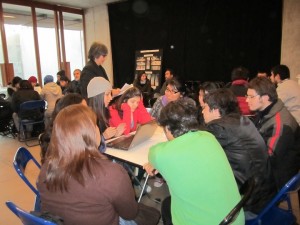The meeting of two Marxists on the 40th anniversary of the Chilean coup
11 September 2013 – Zachary McKiernan

A human rights workshop with university students at José Domingo Cañas (Photo: Yenny Aros). Read more about this site here.
I do not know how many of the learned people who follow this forum know that 40 years ago today the United States government—and to point political fingers at political figures: President Richard Nixon, Secretary of State Henry Kissinger, and CIA Director Richard Helms—actively and illegally supported a bloody military coup that overthrew the democratically elected government in Chile. A lot, I suppose and hope. But I feel compelled to write not only in order to gently remind History@Work’s audiences of the historical importance of this, but also to draw attention to the public history work that has happened to make it worthy of the international attention that it so rightly deserves—and receives.
Since it was first termed “The Other 9/11” by historian Peter Winn—who witnessed firsthand the military bombardment of Chile’s presidential palace, La Moneda—September 11, 1973 is as much our history as it is Chile’s. On that date, president Salvador Allende was deposed by the country’s Armed Forced led by Augusto Pinochet, unconstitutionally ending an unprecedented socialist experiment that came to be via the ballot box. Winn writes on the heels of Chile’s charged 30th anniversary of the military coup, “[It] would change Chile forever, and alter the regional and hemispheric balance of power as well. It was a historical watershed of transcendent importance” (“The Other 9/11: My Coup Diary.” ReVista, Spring 2004, p. 48). That Allende’s Popular Unity government represented an alternative path to socialism that rejected the dominant Cold War rationale of the world’s superpowers seated in Moscow and Washington, so too should the remembrance of it, its overthrow, and the seventeen years of human rights violations that ensued contribute to our understandings of public history’s intimate relationship with memory.
In the past week, I have followed the attention in the United States being paid to the military coup of 1973, and the memory of it. The New York Times has published smart articles by Chileans Pascale Bonnefoy and Ariel Dorfman. Democracy Now has dedicated programs, music, and commentary to commemorate this emblematic anniversary. The Charles Horman Truth Foundation—headed by the widow whose husband was arrested and executed by Pinochet’s forces with U.S. knowledge, if not complicity—honored “champions of justice” such as Judge Juan Guzmán Tapia, scholar and activist Peter Kornbluh, and attorney Nancy Stearns in New York. Even my home campus at the University of California Santa Barbara featured an hour of a “Culture of Protest” on its community radio station to honor the event. In this context, I find it wise to take pause and pass on to today’s readers a prime example of Raphael Samuel’s adage that history is the work of a thousand different hands.
In Allende’s final address to Chileans on Radio Magallenes shortly before his death, the Marxist president assured his constituency that “History is ours, and it is the people who make it.” For the thousands and thousands of Chileans who participated in Allende’s radical and democratic social experiment, la via chilena al socialismo—the Chilean path to socialism—represented an historical process without precedent. Foreshadowing this, the Compañero Presidente boomed in his 1970 inauguration speech from inside the National Stadium,
Chile has just provided an indication of its political development, which is completely unprecedented anywhere in the world, making it possible for an anti-capitalist movement to take power by virtue of the free exercise of the rights of all citizens. It takes power to guide the country toward a new, more humane society, one whose final goals are the rationalization of economic activity, the progressive socialization of the means of production and the end of class divisions.
When this dream came to a crushing end three years later, the battle for the history and memory of this historic rupture began. While the new military leaders preached the dominant narrative of saving the country’s Western-Christian values from a Marxist cancer, so too did a burgeoning—and soon to be famous—human rights movement begin to embark on a distinct type of historical work. This work was ethically and morally motivated to first establish a record of human rights violations during the dictatorship and, second, use this record in calls for truth and justice in the post-dictatorship era.
Aware of the historical weight of their lived experiences during the past 40 years, scores of everyday Chileans have embarked on historical projects in an attempt to write the record and record the memories of the human rights violations committed between 1973 and 1990. Former prisoners and their family members, human rights champions and activists, judges and journalists—a thousand different hands—have come together, sometimes intentionally, other times less so, to create truth commissions and collect testimonies, to erect public memorials and museums, to publish memoirs and produce public lists of perpetrators, and to wage a perpetual battle against a dominant narrative that is becoming less and less dominant. (History@Work readers have heard about some of these citizen-historians in my “Letters from Chile” series, published here last year.)
What I would consider public history work in Chile—the conscious political and moral production of history by a diverse public—works in the service of human rights. Or, to say it in another way, public history work is human rights work. And much of this work focuses on the memory of past human rights violations as part of the search for justice in the present. So the attention to and commemoration of the 40th anniversary of the military coup in Chile and the world over is a testament to not only the to the projects of the two prominent Marxists in this piece, Allende and Samuel, but also to the thousands and thousands of everyday historians who heeded their calls.
~ Zachary McKiernan is a doctoral student in public history at the University of California Santa Barbara.



